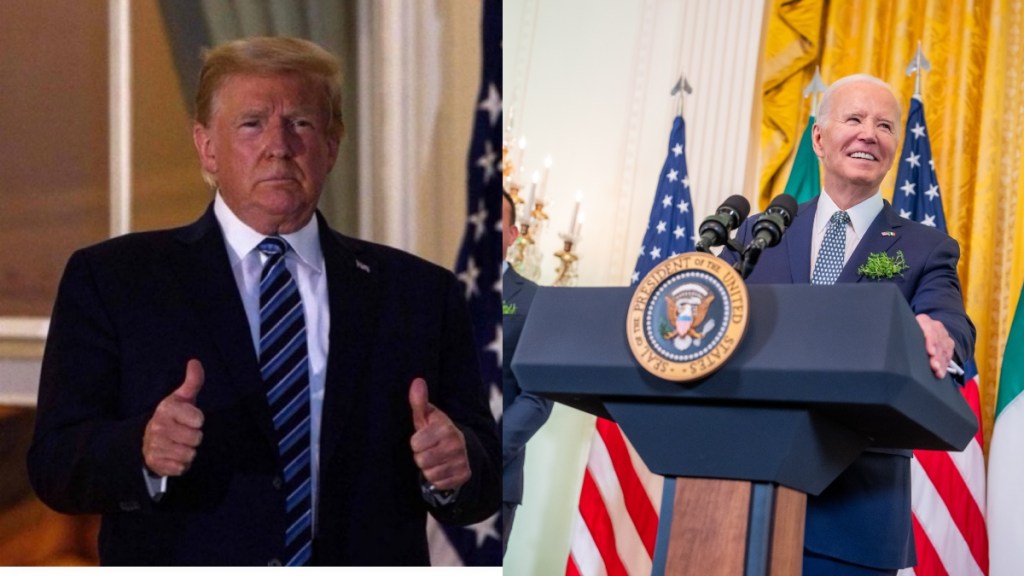By Dr Nidal Shoukeir
The outcome, anticipated by many observers and feared by many, now seems inevitable: both Presidents Joe Biden and Donald Trump are inexorably heading towards a new competition for the American presidency this fall.
It is undeniable that this duel between Biden and Trump differs significantly from previous presidential elections. No one has forgotten how the last confrontation between these two rivals resulted in tragic events, notably the assault on the Capitol and President Trump’s boycott of President Biden’s inauguration ceremony on January 20, 2021.
Some believe that the United States is now heading towards an intense confrontation, steeped in revenge and vengeance between “fierce adversaries,” even “enemies.” And it is likely that this confrontation will reach extreme temperatures, certainly surpassing American borders. Historically, American elections have never garnered as much global interest as they do today. Yet today, after nearly eight years of rule by “opposites,” the duel between Biden and Trump has transformed the deep internal divide into a distinct global phenomenon that has divided the world into two camps: one favorable to Trump and the other to Biden.
Many allies of the United States, as well as its enemies, seem to have clear positions on this imminent confrontation. For example, Ukraine, represented by its President Volodymyr Zelensky clearly favors Biden and fears Trump’s return to the presidency; especially after the latter’s statement that he could end the war within 24 hours and his refusal to provide a single penny to fund the war between Russia and Ukraine to Viktor Orban, the Prime Minister of Hungary.
The same goes for major European powers such as France and Germany after their dry experience with Trump during his first term. In contrast, Russia, the United States’ main rival, clearly favors President Trump, despite President Vladimir Putin’s declaration favoring President Biden, “whose actions can be predicted.”
As for the United States’ allies in the Gulf countries, their position is not at all clear, especially since relations between Washington and the Gulf capitals were not at their best in recent years under President Biden. Practically, the leaders of the Gulf countries, who have suffered from the vicissitudes between Trump and Biden, have learned from previous years and are now trying to distance themselves as much as possible from this confrontation.
Of course, the situation is quite different on the streets of the Gulf, where one can easily see the great popularity enjoyed by Donald Trump, which is not so much linked to a conviction towards the Republican candidate, but rather to an excessive sensitivity towards the Democratic candidate. In fact, anyone who does not enjoy remarkable popularity in the Gulf is not only linked to their positions towards these countries, but is essentially linked to what is happening in Gaza. Because Biden is considered responsible and a partner in what is happening there, including the continuation of the war to this day.
Today, there is a false impression that Gulf leaders strongly favor former President Donald Trump over current President Joe Biden. Honestly, this may be partly or entirely true if one takes pure sentiment as a criterion; especially since the current president has not shown much sympathy for the Gulf countries during his first term. But in reality, things seem quite different. Today, it’s not about Biden or Trump, or who will come next, as Dr Anwar Gargash, advisor to the President of the United Arab Emirates, Sheikh Mohammed bin Zayed, stated in The New York Times in August 2023.
To answer this question, I say that the preferred candidate of the Gulf countries in these elections, and any subsequent elections, is:
The one who believes first in a genuine partnership and friendship between Washington and the Gulf capitals and works hard to preserve and develop them.
The one who will not bargain on the security of the Gulf countries or on their strategic relations. The one who will extend a hand to allies in the Gulf countries and assist them in their ambitious path towards the future.
The one who will respect the peoples of the Gulf and their cultures and appreciate their societies as they are without seeking to change them.
Thus, I believe that the most important question today is not who the Gulf countries prefer for the position of President of the United States. Rather, it is about determining which American candidate meets all these specific characteristics of the Gulf countries?
The author is Professor of Strategic Communication and Government Relations, and is based in Paris.
Disclaimer: Views expressed are personal and do not reflect the official position or policy of Financial Express Online. Reproducing this content without permission is prohibited.

